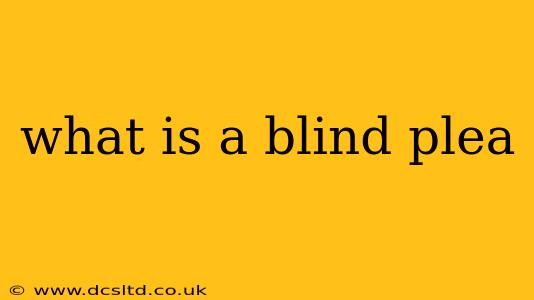What is a Blind Plea? Understanding the Implications of Blind Guilty Pleas
A blind plea, in the context of criminal law, refers to a guilty plea entered by a defendant without a negotiated agreement with the prosecution. This means the defendant pleads guilty to the charges without knowing the specific sentence they will receive. Unlike a plea bargain where the prosecution and defense agree on a sentence or a range of sentences in exchange for a guilty plea, a blind plea leaves the sentencing entirely up to the judge's discretion.
This can be a risky strategy, as the judge has complete freedom to impose any sentence permitted by law, potentially resulting in a harsher penalty than the defendant anticipated. However, there are situations where a blind plea might be a strategic choice.
Why Would Someone Enter a Blind Plea?
Several factors can lead a defendant to enter a blind plea:
-
Lack of a Negotiated Plea Agreement: The prosecution may be unwilling to negotiate a plea bargain, perhaps due to the severity of the crime, the strength of the evidence, or the defendant's criminal history. In such cases, the defendant might opt for a blind plea as a way to potentially minimize their sentence, hoping for leniency from the judge.
-
Uncertainty About the Strength of the Evidence: The defendant may believe they have a weak defense and that going to trial would likely result in a conviction with a potentially longer sentence. A blind plea allows them to avoid a trial and potentially receive a shorter sentence than they might face after conviction at trial.
-
Desire for a Speedy Resolution: Entering a blind plea can expedite the legal process, allowing the defendant to resolve the case quickly and avoid the time and expense of a trial. This is particularly appealing for defendants who are incarcerated and wish to shorten their time in custody.
-
Hope for Leniency: The defendant might believe that expressing remorse and accepting responsibility for their actions through a guilty plea might lead the judge to be more lenient during sentencing.
What are the Risks of a Blind Plea?
The primary risk of a blind plea is the unpredictability of the sentence. The judge can impose the maximum penalty allowed by law, which could be significantly longer than what the defendant might have received through a plea bargain. Other risks include:
-
Lack of Control Over Sentencing: The defendant has no say in the outcome of sentencing, leaving them entirely at the mercy of the judge's judgment and interpretation of the facts and circumstances.
-
Potential for a Harsher Sentence Than Anticipated: The judge may consider factors not initially apparent to the defendant, leading to a harsher outcome than expected.
-
No Guarantee of Specific Outcomes: Unlike a plea bargain which provides certainty, a blind plea offers no guarantees about the eventual sentence or conditions of probation or parole.
What Happens After a Blind Plea?
After a blind plea is entered, a sentencing hearing is scheduled. The judge will consider several factors, including the defendant's criminal history, the seriousness of the offense, and any mitigating or aggravating circumstances. The prosecution will typically present evidence and arguments supporting a harsher sentence, while the defense will attempt to mitigate the sentence. The defendant may also be given the opportunity to address the court.
Is a Blind Plea Right for You?
The decision of whether to enter a blind plea should not be taken lightly and should only be made after careful consideration and consultation with an experienced criminal defense attorney. The attorney can assess the strengths and weaknesses of the case, evaluate the risks and potential outcomes of a blind plea, and advise the defendant on the best course of action. It is crucial to understand that this decision may have long-lasting consequences.
This information is for educational purposes only and does not constitute legal advice. If you face criminal charges, consult with a qualified attorney in your jurisdiction.
